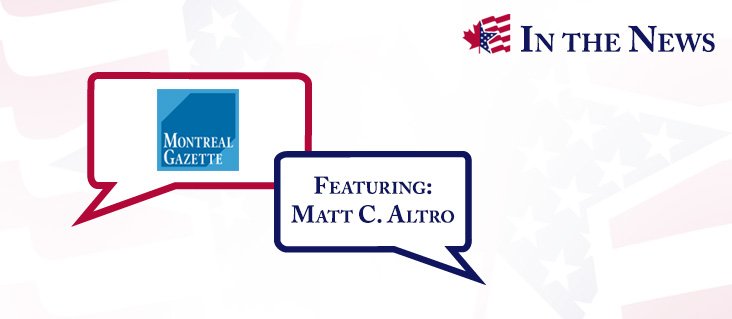Matt C. Altro is a regular contributor to Paul Delean’s business column in the Montreal Gazette. Click here to view the article online or scroll down to read Matt’s answer to the third question below.
Lowering the tax bill on pension income and tax credits for renovations were among the topics raised in the latest batch of reader letters. Here’s what they wanted to know.
PAUL DELEAN
The Montreal Gazette
Tuesday, November 17, 2014
Q: “I have a fairly good pension plan from where I worked, and QPP. I am paying deductions at source for the work pension but nothing to Quebec. For 2012, I paid just over $3,000 for income tax. I asked at my bank if there was anything I could do to lower my taxes but I was not happy with the answer. In 2013, I put $5,000 into an RRSP and managed to lower my income taxes to $500 but I do not have a lot of room for further RRSP contributions. I was told that I could put money into a RESP (Registered Education Savings Plan) for my grandchildren and claim the payments as deductions then later, if needed, I could remove my portion without penalty. Is this true?”
A: Your RESP information is incorrect. While it’s an attractive and underused program, there is no tax deduction connected to contributions, so it won’t reduce your taxes in any way. You’re far from the only one looking for ways to lower your post-retirement tax bill, but there aren’t really a whole lot of options beyond pension-income splitting (if you happen to have a spouse). The bad news is that the RRSP contributions also will need to come out at some point, and they’ll be taxable as well.
Q: “We replaced some of our windows in May and had our roof reshingled in July. Do either qualify for the provincial tax-credit programs? The windows were $15,000 and the roof $9,000 for a total of $24,000.”
A: Your renovations may qualify for a credit on your 2014 tax return, provided they were done by a registered contractor, within the dates specified, and the materials met government requirements (EnergyStar certification for the windows, for instance). The windows normally would fall under the EcoRénov program (for work contracted between Oct. 7, 2013 and Oct. 31, 2014), and the roof under LogiRénov (covering projects signed for between April 24, 2014 and July 1, 2015). If conditions were met, you’d be eligible for $2,500 for the windows (20 per cent of the expense above $2,500, to a maximum of $10,000) and $1,200 for the roof (20 per cent of the amount above $3,000, to a maximum of $2,500).
Q:“My daughter has just moved to the U.S. She’ll be a permanent resident. Does she have to file both Canadian and U.S. tax returns this year and thereafter?”
A: Matt Altro of MCA Cross Border Advisors Inc. says your daughter will need to file an “exit return” to Canada Revenue Agency and Revenue Quebec for 2014, and she may owe departure tax, depending on her assets. She won’t need to file Canadian returns beyond that unless she is earning Canadian source income, such as employment or rental income. “On the U.S. side, she will also file a U.S. return starting with the 2014 tax year, and report worldwide income from the day she became a U.S. resident,” Altro said. If she has investment or bank accounts in Canada totaling more than $10,000, she must also complete additional U.S. filings such as foreign bank account reports for each year.
Montreal Gazette invites reader questions on tax, investment and personal-finance matters. If you have a query you’d like addressed, please send it to Paul Delean, Montreal Gazette Business Section, Suite 200, 1010 Ste. Catherine St. W., Montreal, Que., H3B 5L1, or by email to pdelean@montrealgazette.com

